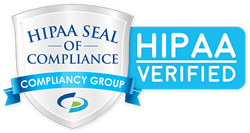Compliance auditing is the act of examining your IT infrastructure and analyzing how likely it is for a data breach to occur. Performing audits is vital because it allows you to identify weaknesses and vulnerabilities in your company’s network security.
Ensure Your Cybersecurity Is Up to Date; Stay Compliant With Industry Standards
Cybersecurity compliance audits are essential to keeping your entity and customer’s valued information private. Various audits are required or recommended depending on your industry.
PCI Compliance Audit Requirements
Payment Card Industry Data Security Standard (PCI DSS) is a set of requirements enabled to any business that processes, stores, or transmits debit/credit card data. PCI DSS compliance ensures companies maintain a secure information processing environment. The purpose of PCI DSS is to promote account security and keep customer identity anonymous throughout the transaction process.
There are 12 PCI compliance audit requirements all businesses who handle debit/credit card information must abide by:
- Apply and maintain firewalls against hackers
- Ensure efficient password protection
- Always protect cardholder data
- Encrypt transmitted debit/credit card data
- Utilize and sustain anti-virus protection
- Regularly update software to eliminate security gaps
- Restrict data access to unauthorized persons
- Create individual credentials for access
- Keep all cardholder data in a secure physical location
- Document all activity to data using logs
- Routinely scan and test for network vulnerabilities
- Document policies of accessing cardholder data
Benefits of PCI DSS Audits
Although PCI audits may seem daunting, they offer many benefits to both the cardholder and the company that handles cardholder data. PCI compliance audits ensure your systems are secure, which in return will improve your business’s reputation because customers know they can trust you with their sensitive information.
PCI DSS compliance audits also help prevent security breaches and data theft. Overall, it improves your company’s IT infrastructure because it identifies potential vulnerabilities and promotes network security best practices.
PCI DSS Audit Frequency
PCI Security Standards Council requires an audit every 90 days, or once per quarter. However, PCI audit frequencies also vary depending on the payment card company you work with. Each major brand has differing requirements for merchants and service providers.
HIPAA Compliance Audit Requirements
HIPAA compliance is a process that health and medical institutions follow to keep client healthcare data private. The Office of Civil Rights (OCR) conducts HIPAA audits, tracks how compliant a facility’s process is, and identifies areas of improvement.
There are six steps your facility must take to ensure you meet all HIPAA compliance audit requirements:
- Manage HIPAA training for all employees
- Develop a risk management plan and execute a risk analysis
- Nominate a security and privacy officer who is responsible for meeting regulations
- Review how policies are implemented and if they’re executed consistently
- Run an internal audit to identify issues before the OCR audit
- Create an internal remediation plan to reduce risks and fill vulnerability gaps
HIPAA Compliance Audit Frequency
There’s no specific time of the year the OCR comes in to audit a medical institution. Many people believe they sporadically make an appearance to ensure the infrastructure is running smoothly. However, many common instances could trigger a HIPAA audit, including:
- Patient complaints
- Employee complaints
- Employee mistakes
- Insider wrongdoing
- Third-party mistakes
- Security incident
NIST Compliance
NIST stands for the National Institute of Standards and Technology. They’re a non-regulatory agency whose primary role is to develop security control standards. NIST compliance standards are based on security best practices and designed for all federal supply chain industries. NIST compliance standards are not mandatory for all entities but are heavily recommended by government officials.
Although NIST compliance is not a requirement for all industries, their compliance standards come with many benefits, including helping organizations secure their data and network, protecting them against cyberattacks, malware, and other cyber threats. In addition, NIST helps lay the foundation for companies to follow when achieving compliance with specific regulations such as PCI and HIPAA.
Since not all entities require NIST compliance audits, audit frequency varies as needed. However, it is recommended to conduct a NIST audit every two years to ensure your company is up to date with industry standards.
Types of Network Security Audits
Routine Audit
Routine audits are essential to upkeep your company’s cybersecurity program. They ensure there are no gaps or vulnerabilities in your network security; these audits can include risk assessments, vulnerability assessments, penetration tests, as well as compliance audits. Routine audits are scheduled and performed on a more frequent basis.
- Risk Assessment—help identify, estimate, and prioritize risk
- Vulnerability Assessment—offers vulnerability scans to uncover flaws in security procedures
- Penetration Test—when a security expert voluntarily hacks your network to identify vulnerability gaps
Routine audit frequency is dependent on your company’s size and network security needs; it’s recommended that they’re done twice a year.
Special Audit
Special audits occur when there’s been a disruption in your organization’s network security, such as a data breach. After a data breach, special audits are essential to identify where the violation occurred and what you can do to eliminate it from happening again.
Special audits should take place after:
- A security incident or breach
- New installations or system upgrades
- Changes to the compliance policy
- A business merger
- Digital transformation
- Implementing new equipment
Secure Your Network With The Logic Group
The Logic Group has been a leading cybersecurity provider since 1996. With over 150 years of combined professional experience, we’ve helped clients in almost every industry. We ensure we have a solution that will satisfy you and your company’s needs as well. Contact us today to keep compliant and learn more about our cybersecurity compliance solutions.




